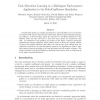458 search results - page 36 / 92 » Q-Decomposition for Reinforcement Learning Agents |
JMLR
2006
13 years 7 months ago
2006
In this article we describe a set of scalable techniques for learning the behavior of a group of agents in a collaborative multiagent setting. As a basis we use the framework of c...
MAGS
2010
13 years 2 months ago
2010
Coordinating agents in a complex environment is a hard problem, but it can become even harder when certain characteristics of the tasks, like the required number of agents, are un...
AAAI
2008
13 years 10 months ago
2008
Potential-based shaping was designed as a way of introducing background knowledge into model-free reinforcement-learning algorithms. By identifying states that are likely to have ...
ICES
2003
Springer
14 years 28 days ago
2003
Springer
Abstract. In [8] Yamauchi and Beer explored the abilities of continuous time recurrent neural networks (CTRNNs) to display reinforcementlearning like abilities. The investigated ta...
AAAI
2011
12 years 7 months ago
2011
We describe the Fourier Basis, a linear value function approximation scheme based on the Fourier Series. We empirically evaluate its properties, and demonstrate that it performs w...

